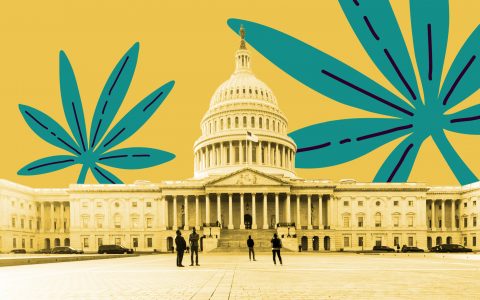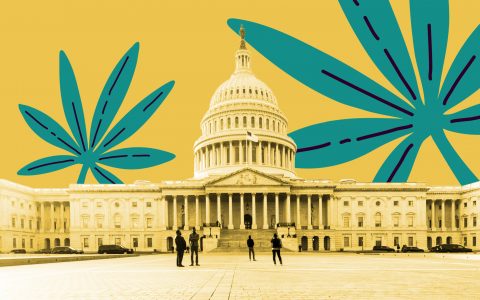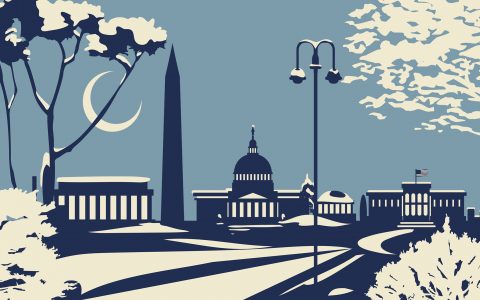A new federal spending bill introduced by House Democrats over the weekend may break two logjams in one fell swoop.
One provision in the bill would provide legal protections for banks that work with the cannabis industry, while another would allow Washington, DC—where cannabis is legal but retail sales are prohibited—to finally launch a commercial cannabis market.
The measures are included in a spending package prepared each year by the US House Appropriations Subcommittee on Financial Services and General Government. This version, which will fund government in 2020, is the first spending bill in eight years to be steered by Democrats, who in recent years have warmed to federal legalization.
The proposed spending bill would protect financial institutions by preventing regulators at the Department of the Treasury from penalizing banks that work with state-legal cannabis businesses. The bill does not apply to prosecutors at the Department of Justice, which is regulated in a different bill.
The spending bill would also erase a long-held restriction, known as the Harris rider, that has prevented Washington, DC, from creating and regulating a commercial cannabis industry of its own. Voters legalized cannabis through a 2014 ballot measure, but the Harris rider has prevented the DC Council from establishing a regulated market.
“Americans deserve a government that will invest in the long-term protection of consumers and investors, strengthen our national security, and promote entrepreneurship here at home,” said US Rep. Mike Quigley (D-IL), committee chairman, said of the bill at large. “This year’s [Financial Services and General Government] funding bill takes significant steps to accomplish each of those goals.”
Banking for Cannabis
Federal banking laws have long been a source of frustration for the cannabis industry. Many businesses are unable to obtain basic financial services such as bank accounts, which can force them to keep their money in cash and make them prime targets for robbery. Cannabis businesses and their employees are also frequently denied loans, lines of credit, or even home mortgages.
The language in the new spending bill addresses this concern explicitly: “None of the funds made available in this Act may be used to penalize a financial institution solely because the institution provides financial services to an entity that is a manufacturer, a producer, or a person that participates in any business or organized activity that involves handling marijuana, marijuana products, or marijuana proceeds,” it reads.
By providing what is essentially regulatory immunity for banks that work with cannabis clients, the bill echoes past efforts at curbing federal cannabis enforcement, such as the so-called Rohrabacher–Blumenauer amendment, which blocked the Justice Department from prosecuting state-legal cannabis. It also follows in the footsteps of the wider-reaching SAFE Banking Act, a bill likely come up for a floor vote in the next few weeks.
The new spending bill is the latest step to address what’s been a growing outcry around the lack of banking services for the legal cannabis industry. Last month, an open letter signed by all 50 state banking associations, as well as Puerto Rico’s, called on the Senate Banking, Housing and Urban Affairs Committee to consider the merits of cannabis-related businesses.
The nonpartisan Congressional Budget Office recently released a report that projected that banks could see an expected $1.2-billion increase in deposits by 2022 if the SAFE Banking Act passes, while credit union deposits could grow by $200 million. By 2029, the report projects, those amounts “would rise to $2.1 billion and $350 million, respectively.”
Draining DC’s Cannabis Swamp
Elsewhere in the spending bill, Democrats eliminated a Republican-written rider that prevents local government in the District from using its own tax dollars to regulate cannabis industry. The rider is as far-reaching as it is insidious: While it stands, DC lawmakers can’t even legally hold hearings on cannabis. (When DC Mayor Muriel Bowser planned to hold hearings on the matter in 2015, two Republican congressmen warned that she would be arrested.)
Even prior to the spending bill’s passage out of committee, Bowser had already announced plans to revisit DC cannabis sales sometime later this year.
A Hazy Road Ahead
Despite excitement around the new spending bill, its future is far from certain. It’s subject to markups both at a subcommittee meeting on Monday evening and in the coming weeks, when it will be considered and possibly amended on the House floor and, later, by the Republican-held Senate.
On top of that, Congress generally has shown itself to be capable of passing anything recently. “We don’t have a lot of people in government right now who know how to govern or who want to govern,” quipped Rep. John Yarmuth (D-KY), chairman of the House Budget Committee.
Hurdles aside, the new spending bill should give cannabis advocates hope. It’s a sign that, at the very least, lawmakers increasingly are coming around to the reality that cannabis is here to stay.







